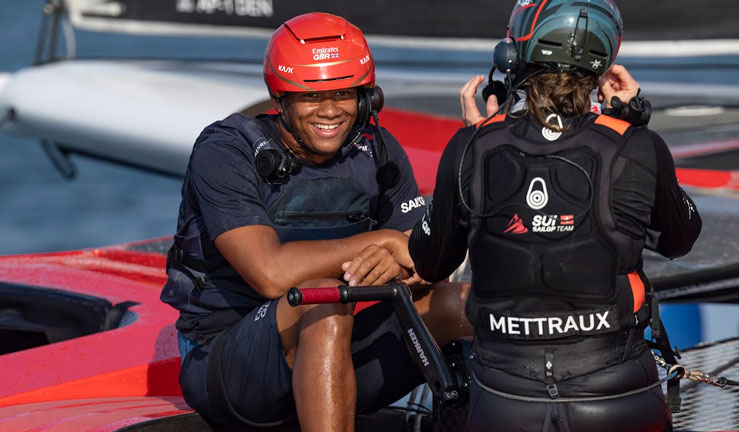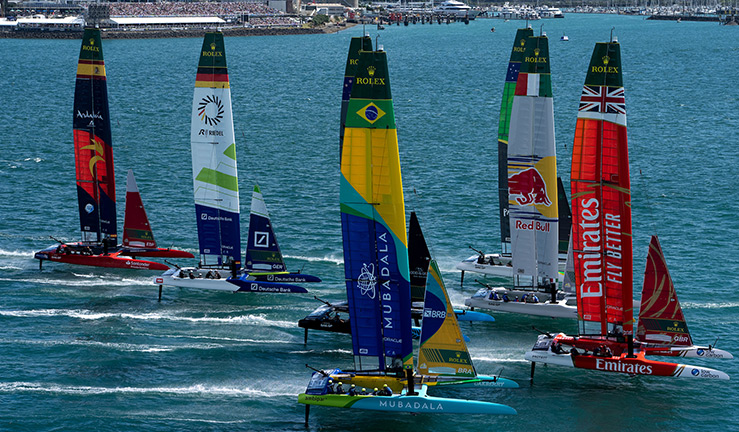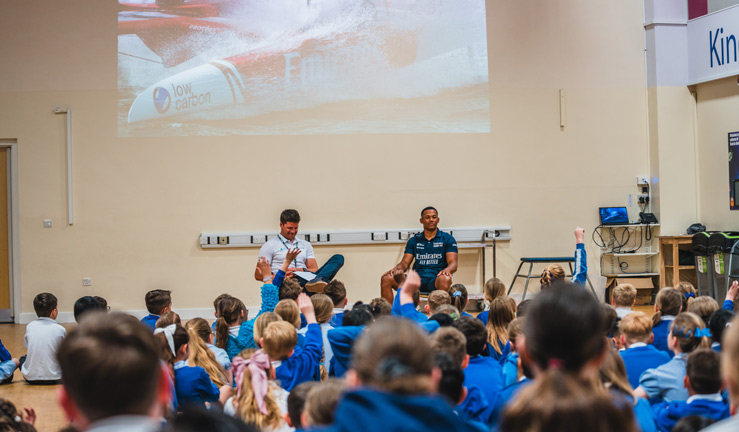From North London to a World Stage

He was introduced to the sport back in 2017 by his school in North London, and within two years, he made history as the youngest ever competitor in the iconic Fastnet Race.
Since then, his achievements have continued to grow: Cowes Week Young Skipper of the Year (2023), Youth Trophy Winner (2024), and the Youth Sport Trust’s Young Sportsperson of the Year, amongst others.
In 2023, Kai interned with Emirates GBR’s F50 Shore Team, an experience that led to an invitation from Sir Ben Ainslie to join the Athena Sports Group as a Development Sailor—working across SailGP, the America’s Cup, and the Athena Pathway Programme.
With SailGP returning to Portsmouth this July—and the RYA stepping in as the event’s official Community Impact Partner— we sat down with Kai to talk beginnings, personal reflections, and the importance of making sailing more accessible to the next generation.
Can you tell us about how your journey into sailing began and what initially drew you to the sport?
My journey began in Year 7. My school, The Greig City Academy in Hornsey, North London —had a sailing project. I’d never really done sailing before, so I thought, "Why not give it a go?" It was something new and yeah, it just started from there.
I really fell in love with sailing. I began training in reservoirs and then started going down to the South Coast—places like Cowes—on the weekends. It just grew from there.
When you first started, did you face any challenges? How did you deal with them?
Definitely! One big challenge was the travel. We didn’t live near the sea or any major sailing hubs like Portsmouth, Southampton, or Weymouth. So, there was a lot of travelling involved. We’d have to leave school at lunchtime on Fridays to get to the coast for evening sessions, then sail all weekend, and come back Sunday night—only to be back at school Monday morning.
Another challenge is that sailing can be an expensive sport. You’re always needing new sails or parts for your boat. That was a struggle, but lucky enough, the sailing community has always supported us. There have been people in the industry who’ve helped us get what we needed and that’s been a really cool thing.
So, you’ve done a lot in sailing already—have there been any standout highlights in your career so far?
Yeah, there’ve been a few. One I really enjoyed was in either Year 11 or Year 12. My friend and I sailed a 30-foot keelboat and we started the season in Cowes and did pretty well. We trained with some of the top guys, and then they invited us to Miami to train out there. The people really liked having us around, and eventually we got invited to compete in the World Championships in Miami, which was crazy for us.

Has sailing taught you anything that’s helped you outside of the sport?
Yeah, definitely—hard work creates results. You don’t see top Olympians like Dylan and Hannah get to where they are without putting in the work. That mindset can be used in any area of your life, no matter what you’re doing—whether it’s university, work, if you’re starting sailing or a different sport. The hard work you put in behind the scenes is what gets you the recognition and results in the end.
Was there a moment when you realised you could actually pursue a career in sailing?
I’ve always wanted to do it, like most people who get serious about a sport but the moment I knew “This could actually be a job”—was when I got the call to join the Emirates GBR team. I was in the sixth form common room. Mr. Holt, the head of sixth form, actually got the call first. He was even more excited than I was! He told me it meant more to him than getting his own call to say he got into Cambridge back in the day. He’s also the one who took us sailing.
Have you seen any changes in the sport over the years in terms of who gets involved?
Definitely. Not just in sailing side but in support roles too. For example, the SailGP tech site is probably 50/50 male and female. That’s been really cool to see actually.
There are also more people getting into STEM, media, and other roles. They work just as hard as the sailors, and it’s great to see more people get into that side of the sport.
One thing I really do like—and it’s already being improved —is the Pathway programme under the RYA and the British Sailing Team. Like in football, you’ve got a development scheme for people with potential and the right mindset who aren’t quite there yet but have something to build on. That’s what I want to work on in the future and it’s already being worked on at the same time.
Why do you think having different voices and backgrounds in sailing matters, not just for the individuals, but for the sport as a whole?
I think it's because at the end of the day, everyone wants the sport to grow. Everyone wants it to be a mainstream sport and to get it to that standard. I can see it being on the same standard as football or cricket or rugby, but it needs mass participation. No matter where you're from, no matter who you are - we need the mass participation to get to where it needs to be.
I think that's why it's so important for people to try it. Also, it’s the skills you learn… there's not many sports where you learn real grit and stuff. Everyone can play football for an hour on a Tuesday but to sail on the Solent on a Sunday evening in December, that that takes a real grit. So yeah, I think you do you learn a lot of skills that you don't from other sports.

Have you seen your work make a difference in helping others see a place for themselves in sailing?
Yeah, 100%. Even in my own school team, a lot of us are now in the marine world but not everyone’s gone into professional sailing, I think it’s been really cool to show my team mates, my pupils, everyone in my school and people from where I’m from that there are jobs out there. Emirates GBR and the Athena Pathway are putting opportunities in place for people to see where they can go in sailing in the future.
SailGP and the RYA are partnering on some community initiatives around Portsmouth. Why do you think partnerships like this are important?
Yeah, I think it’s just important to get British people excited about sailing. We did do that during the Olympics and the America's Cup but the RYA is the main hub of sailing in the UK. I think this collaboration can really bring it into the mainstream.
Recently you came to visit several schools in Portsmouth ahead of the SailGP event in July—was there anything that stood out to you from the day? And why was that experience important to you?
There really was. What stood out was just how enthusiastic the kids were about sailing, and how excited they were that the event was coming to their hometown, Portsmouth. They were so excited but also, they were all really keen on the Impact League which is about sustainability, diversity, and technology in the sport. They were really interested in how they can make sport more sustainable and it was really cool to see them interested in that side of it.
So, if a young person saw you racing and thought, “Maybe I could do that,” what would you say to them?
I’d say: just keep going. Get as many hours on the water as you can, wherever you can. Even if you can’t get to big sailing hubs like Solent or Weymouth, train on reservoirs or local waters. No matter where you are just get time on the water and build up that experience. So, when you get those big opportunities, if you get them—racing in big events—you’ll be ready for it. Even if you’re not training with everyone else or you’re training by yourself it’s still worth your time. Keep doing it!
